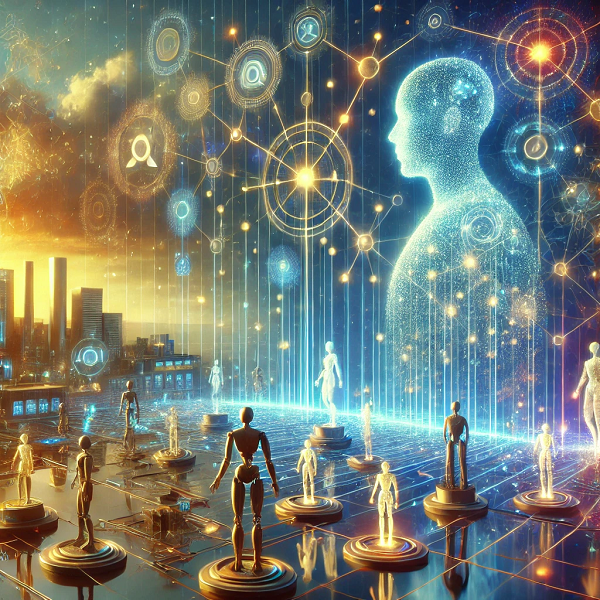Decentralized AI is unlocking the potential for a more inclusive and fair digital future by using blockchain technology to address the risks posed by Big Tech dominance. The growing influence of major corporations such as Google, Amazon, Microsoft, Meta, and Apple over AI development has sparked serious concerns about technology’s impact on privacy, innovation, and equity.
As AI becomes central to our lives, its monopolization threatens societal well-being. A select few controlling this transformative technology creates risks like privacy breaches, economic disparity, and hindered innovation. However, decentralized AI (DeAI) offers a compelling solution by leveraging blockchain and distributed networks to foster a more open and equitable ecosystem.
Risks of AI Monopolization
Effective AI systems require vast datasets and cutting-edge computational infrastructure, resources largely controlled by Big Tech. This concentration grants these companies immense power over personal information and decision-making processes. For example, Google’s integration of AI into its search engine has illustrated the dangers of AI “hallucinations,” where generative AI produces harmful or misleading outputs.
The dominance of monopolistic firms limits the accessibility of AI benefits to those who can afford premium services, creating inequities. It also raises ethical concerns, as centralized AI often reflects the biases and interests of its corporate controllers, leading to exploitation and manipulation. Instances of rushed, flawed AI product launches by companies like Meta and Microsoft underscore these risks.
Moreover, this centralized model stifles competition. Smaller firms face immense barriers as Big Tech uses its financial resources and control over cloud computing—where Microsoft, Amazon, and Google dominate with two-thirds of the market—to maintain their advantage.
The Case for Decentralized AI
DeAI offers an alternative, distributing the development and use of AI through blockchain, decentralized computation, and open-access models. Platforms like Ocean Protocol and SingularityNET illustrate how decentralization can democratize AI.
- Ocean Protocol enables secure, transparent data sharing, allowing developers and organizations to unlock data’s potential without compromising privacy.
- SingularityNET creates a decentralized marketplace for AI services, empowering small developers to monetize their innovations and collaborate globally.
These platforms show how DeAI can reduce barriers and enable diverse contributors to shape the future of AI. Unlike centralized systems, DeAI prioritizes transparency and openness. Blockchain technology ensures transactions and computations are verifiable, limiting hidden agendas from dominant players.
Additionally, DeAI addresses privacy concerns by processing data across decentralized nodes instead of centralized servers, enhancing security and resilience. A decentralized network eliminates single points of failure, ensuring continuous operation and accessibility.
Real-World Potential of DeAI
The concept of decentralized AI is gaining momentum with practical applications. Collaborative efforts, such as miners training and operating parts of large AI models for token rewards, demonstrate how this ecosystem could function. Blockchain-based models can act as smart contracts, enabling decentralized governance and revenue sharing.
Innovative projects like Internet Computer Protocol (ICP) highlight the potential of DeAI. ICP employs decentralized nodes for data processing, community-driven governance, and decentralized web operation of AI applications—eliminating dependence on traditional cloud providers.
Investors are also recognizing the promise of DeAI. Despite a 29% drop in global AI funding in Q3’24, the number of deals hit its highest point since Q1’22. AI infrastructure spending reached $240 billion in 2024, reflecting its commercial viability. Companies like Microsoft, with multi-billion-dollar revenues from AI integrations, underscore the growing demand.
Breaking Free from Monopolies
DeAI has the power to disrupt the monopolistic grip of Big Tech by democratizing access to computational resources and fostering collaboration. Decentralized systems can outperform even the largest supercomputers by leveraging collective innovation. This shift promotes individual autonomy and reduces reliance on centralized entities.
However, policymakers play a critical role in shaping this future. Regulatory measures like the European Union’s AI Act can ensure accountability and fairness. Antitrust actions and investments in decentralized initiatives are essential to foster genuine competition and progress.
A Vision for the Future
Decentralized AI is the next step in technological evolution, offering greater inclusivity and fairness. Just as blockchain transformed financial systems, DeAI has the potential to redefine AI development and deployment. By decentralizing power and resources, DeAI paves the way for a more equitable digital landscape.
Achieving this vision requires collaboration among developers, regulators, and end-users to prioritize transparency, privacy, and cooperation. With the right framework, decentralized AI can empower society while avoiding the pitfalls of Big Tech monopolization.

Leave a Reply